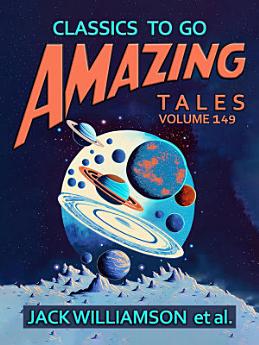Amazing Tales Volume 149
Sep 2023 · CLASSICS TO GO Book 149 · Otbebookpublishing
Ebook
78
Pages
family_home
Eligible
info
reportRatings and reviews aren’t verified Learn More
About this ebook
Dive into the boundless realms of imagination with "Amazing Tales Volume 149", an anthology that captures the essence of classic science fiction through stories of adventure, humor, and discovery. This collection transports readers to distant worlds and cosmic wonders, each tale a testament to the limitless possibilities of the universe. Begin your journey with Jack Williamson's "The Cosmic Express". Set in an age where the stars beckon and the unknown awaits, this story invites you to experience the thrill of interstellar travel. As characters traverse the vastness of space, Williamson's narrative unfolds with the awe and wonder of futuristic exploration, urging readers to dream beyond the confines of Earth. Next, enter the whimsical universe of Fredric Brown's "And the Gods Laughed". Here, a quirky crew stationed on an asteroid finds solace in storytelling amidst the monotony of space. Brown's clever use of humor and tall tales transforms the mundane into a backdrop for cosmic comedy, where laughter becomes the ultimate escape in the silent void. Return to the inventive mind of Jack Williamson in "The Pygmy Planet". Follow Larry Manahan, an advertising agent disenchanted with his everyday existence, as he is drawn into a hidden microcosm teeming with mystery and peril. This thrilling adventure challenges Larry-and the reader-to find courage and curiosity in unexpected places, proving that even the smallest worlds hold grand secrets. "Amazing Tales Volume 149" is a celebration of the human spirit's unyielding quest for knowledge and adventure. Each story is a portal to the extraordinary, inviting you to explore the far reaches of the imagination and the universe alike.
About the author
Jack Williamson, born John Stewart Williamson on April 29, 1908, in Bisbee, Arizona, is a towering figure in the realm of science fiction. Often hailed as the "Dean of Science Fiction," Williamson's career spanned nearly eight decades, making him one of the genre's most enduring and influential voices. His early life was marked by the rugged landscapes of the American Southwest, which imbued his work with a sense of frontier adventure and exploration.Williamson's literary journey began in the 1920s, during the Golden Age of Science Fiction. He was a contemporary of legends like Isaac Asimov and Robert Heinlein, yet he carved out a unique niche with his imaginative storytelling and pioneering ideas. His works often grappled with themes of human evolution, space exploration, and the ethical implications of scientific advancements, reflecting the anxieties and aspirations of a rapidly changing world.A notable controversy in Williamson's career was his early adoption of the term "terraforming," a concept that has since become a staple in science fiction and real-world scientific discourse. His foresight in envisioning the transformation of alien worlds into habitable environments showcased his ability to blend scientific plausibility with creative speculation.Williamson's influence extends beyond his prolific output; he was a mentor to many emerging writers and an advocate for the legitimacy of science fiction as a literary genre. His contributions were recognized with numerous awards, including the Hugo, Nebula, and a Grand Master Award from the Science Fiction and Fantasy Writers of America.In an era where technology and humanity's future are ever more intertwined, Jack Williamson's work remains profoundly relevant, offering both cautionary tales and boundless possibilities. His legacy is a testament to the power of speculative fiction to inspire, challenge, and transform.
Rate this ebook
Tell us what you think.
Reading information
Smartphones and tablets
Install the Google Play Books app for Android and iPad/iPhone. It syncs automatically with your account and allows you to read online or offline wherever you are.
Laptops and computers
You can listen to audiobooks purchased on Google Play using your computer's web browser.
eReaders and other devices
To read on e-ink devices like Kobo eReaders, you'll need to download a file and transfer it to your device. Follow the detailed Help Center instructions to transfer the files to supported eReaders.











